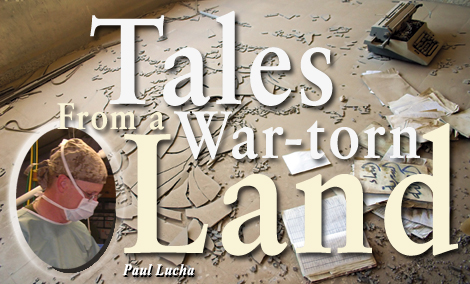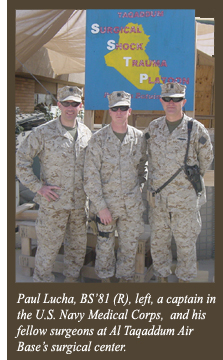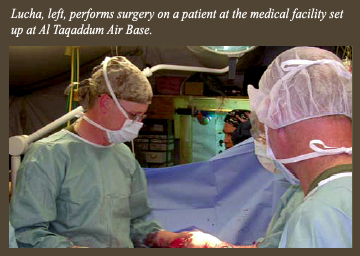
“These people
got hurt trying
to do something
they think is
right and they
think is worth
getting hurt for.
To help someone
like that is an
honor.”

“We weren’t sure
if we were help-
ing the ‘good
guys’ or the ‘bad
guys,’ but most of
us didn’t give it
any thought.”
Battlefield Surgeon Proud to Have Served

As a captain in the Medical Corps of the United States Navy, Paul Lucha, BS’81 (R), was anxiously looking forward to his seven-month deployment to Iraq. “That’s what you’re training for, and that’s what everyone looks forward to,” he says. Lucha didn’t have the opportunity to talk to anyone deployed before him and wasn’t sure what to expect, and he returned to the United States surprised and inspired. “I went with three of my partners and we all say the same thing — out of over 20 years on active duty, going to Iraq was one of the best things we’ve ever done.”
The Mantua, N.J., resident and his partners were stationed from August 2005 to March 2006 on Al Taqaddum Air Base — located in central Iraq about 35 miles west of Baghdad. “It was like a scene from an old ‘M*A*S*H’ rerun,” he says. “We had air conditioning and heat, but we were working out of tents.”
Lucha commanded a surgical unit that treated battlefield injuries. More than 50 Naval medical officers worked for him to provide initial treatment to patients in the emergency room, take X-rays and oversee the blood bank. Ten Marines were also assigned to maintain the ambulances, electrical setups and generators, and to provide security when the base admitted Iraqi civilians and members of the Iraqi Army.
One of his first patients was a severely injured Marine. “I got to know him very well. He gave me insight to what the Marines were trying to do on the ground. I’ve always had an enormous respect for what the Marines do, but now I have an even greater admiration.”
Each day, three to 10 patients would be admitted to the facility, about half of whom were Iraqi. For safety, the Marines screened the patients and took their weapons away before admitting them. “Two minutes of precaution definitely saved some troubles down the line,” says Lucha. “One guy came in with a fractured leg, and his buddy used a rifle to splint it. It turned out that the rifle was still loaded, so we had to get the Marines to come take care of it.”
Most of the time, it was unclear whether the Iraqis treated were civilians or insurgents. “We weren’t sure if we were helping the ‘good guys’ or the ‘bad guys,’ but most of us didn’t give it any thought. If they came in and were hurt, we would treat them in the same way we’d treat anyone,” Lucha explains.
The base had a limited blood supply, so if patients needed a lot of blood, a “walking blood bank” would be used. “Someone would come around and ask everyone on base to donate blood, and we would always end up with more volunteers than were needed.”
Iraqi patients seemed grateful for the medical aid. “For the most part, Iraqis wanted to be taken care of by American physicians,” Lucha explains. “I never saw anyone that was belligerent or screaming.” However, security threats from outside of the base were frequent. “Our base took indirect fire — rockets into the base — probably three times a week. You realize very quickly that there’s not much you can do. You can’t take any special precautions to prevent them, so you just have to go on and hope that no one is injured,” says Lucha.
“It puts that
sense of mortality
right in your face.
You have to decide
how to tell your
family that this
isn’t a weekend
away, this is long-
term and someone
could get hurt.”Lucha says the hardest part about the deployment was being away from his wife and two children, especially when things became dangerous. “It puts that sense of mortality right in your face,” he says. “You have to decide how to tell your family that this isn’t a weekend away, this is long-term and someone could get hurt. But, as I told my wife, if I had to go somewhere dangerous, what better place than right in the middle of a group of Marines?”
To Lucha, the best part of his deployment was having the privilege to take care of patients — both Iraqi and American. “These people got hurt trying to do something they think is right and they think is worth getting hurt for. To help someone like that is an honor,” he says.
Since his return from Iraq, Lucha has been working as a surgeon at the General Hospital in Portsmouth, Va. He is preparing to return to Iraq for another seven months after his 18-month rotation. “Many people have been over there multiple times,” he explains. “We don’t want to leave our families, but we want to help with something we think is right and worthwhile.”
When asked if there is one lesson he learned in Iraq, Lucha says, “I noticed, at least among the Iraqis I met, that they really just want the kind of freedoms that we enjoy. I think more of them want that than want the Americans out. It has nothing to do with Islam or Christianity, it has to do with freedom and basic human rights. I think that’s important for others to know.”
— M.E.B.
Soldier's Story | Volunteer Meets Refugees | Nursing the Wounded
Scales of Justice | Article Home
FDU Magazine Home | Table of Contents | FDU Home | Alumni Home | Comments
©Copyright 2007 Fairleigh Dickinson University. All rights reserved.
For a print copy of FDU Magazine, featuring this and other stories, contact Rebecca Maxon, editor, 201-692-7024 or maxon@fdu.edu.
